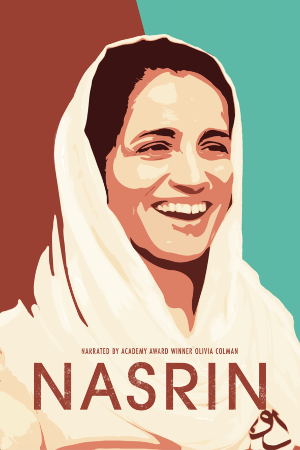
Nasrin 2020
Distributed by Collective Eye Films, 1315 SE 20th Ave. #3, Portland OR 97214; 971-236-2056
Produced by Jeff Kaufman and Marcia S. Ross
Directed by Jeff Kaufman
Streaming, 91 mins
Middle School - General Adult
Biography; Civil Rights; Human Rights; Law; Punishment; Women’s Rights
Date Entered: 03/17/2021
Reviewed by Kathleen Spring, Nicholson Library, Linfield University, McMinnville, OR“The question of human rights is the same all over the world” – so says Nasrin Sotoudeh, the subject of Jeff Kaufman’s documentary Nasrin. Sotoudeh is an internationally known Iranian attorney and human rights activist who has focused her career on seeking justice for children, women, religious and ethnic minorities, and survivors of abuse, even as she faces her own legal problems in her home country for being an activist. Kaufman could not obtain a visa to travel to Iran to film, so Nasrin relies heavily on footage that was secretly shot inside Iran by individuals who risked being arrested if discovered. In addition to this footage showing Sotoudeh at her office, representing clients in court, and at home with her husband and children, Kaufman includes archival photos from Sotoudeh, as well as interviews with other human rights activists (among them Mansoureh Shojaee and Nobel Laureate Shirin Ebadi), artists, and journalists.
Sotoudeh’s goals of freedom, prosperity, and human dignity for all are on display throughout the documentary. In the second half of the film, Kaufman focuses on Sotoudeh’s preparations for the defense of Narges Hosseini, a young student arrested for removing her headscarf in public and waving it on a stick to protest the compulsory hijab laws that have been in place since the Iranian Revolution of 1979. Despite legal setbacks and threats against her personal safety, Sotoudeh maintains a positive outlook and vows to continue fighting for her clients and working toward judicial reform.
The film is lightly narrated (by Academy Award winner Olivia Colman), but the narration feels forced at times, almost as if it has been spliced together from different documentaries about Sotoudeh. For example, on multiple occasions Sotoudeh is referred to in narration by both her first and last name, as if the audience might confuse her with someone else. Colman also reads English-language translations of letters from Sotoudeh to her children and husband, but it would have been more effective to hear these read in voiceover in their native Farsi by Sotoudeh herself.
Notwithstanding the narration issues, the film is an excellent portrayal of the challenges Iranian women continue to face, and it provides an updated look at the women’s rights movement in Iran. Of interest to academic libraries with collections in Middle Eastern Studies, women’s/gender studies, and law, Nasrin could be paired with Shirin Ebadi: A Simple Lawyer to familiarize students with prominent activists in this area.
In Farsi and English, with English subtitles.
Published and licensed under the Creative Commons Attribution 4.0 license. Anyone can use these reviews, so long as they comply with the terms of the license.